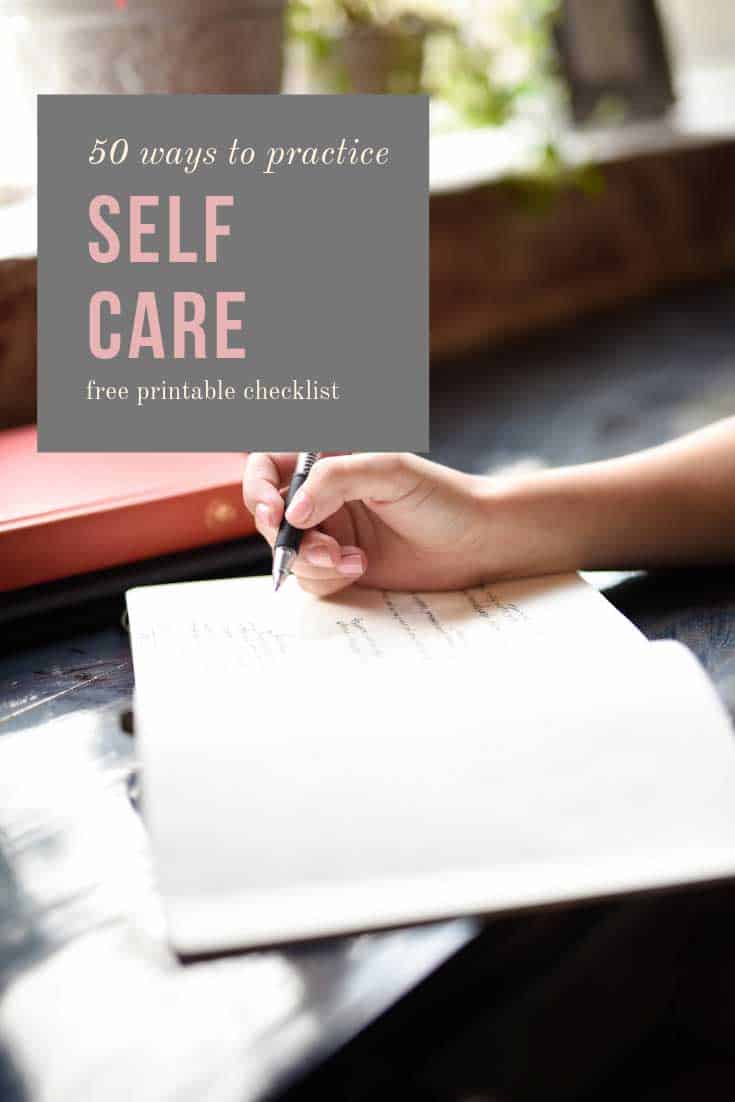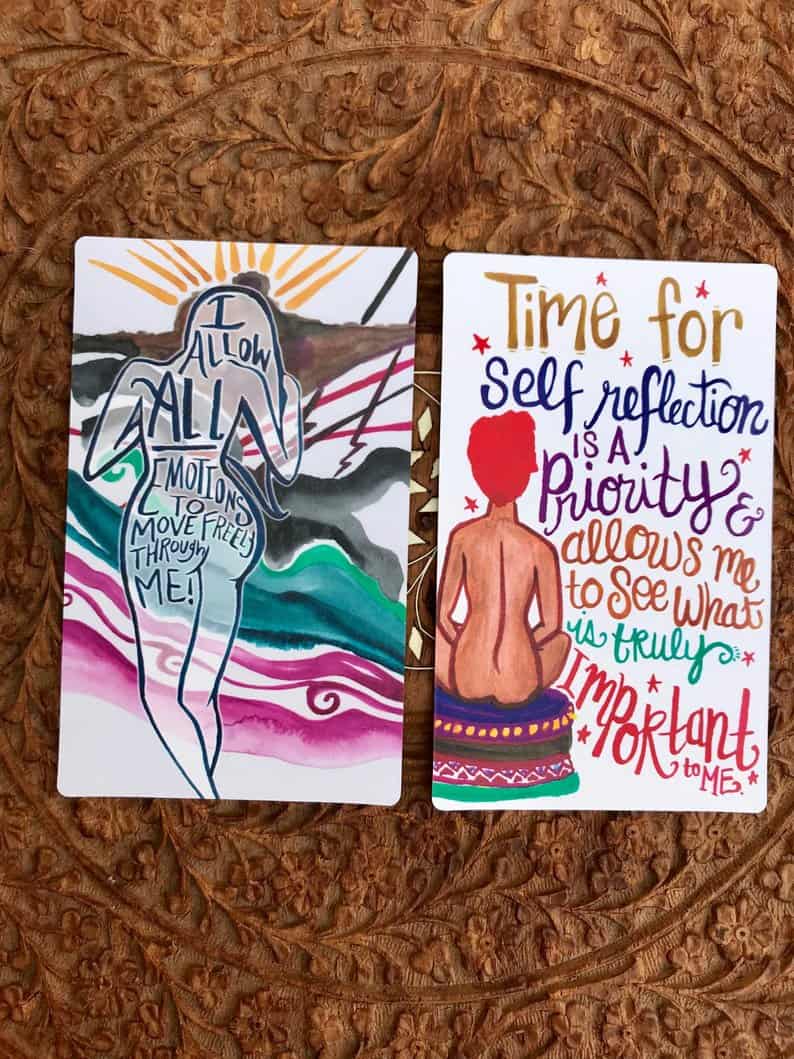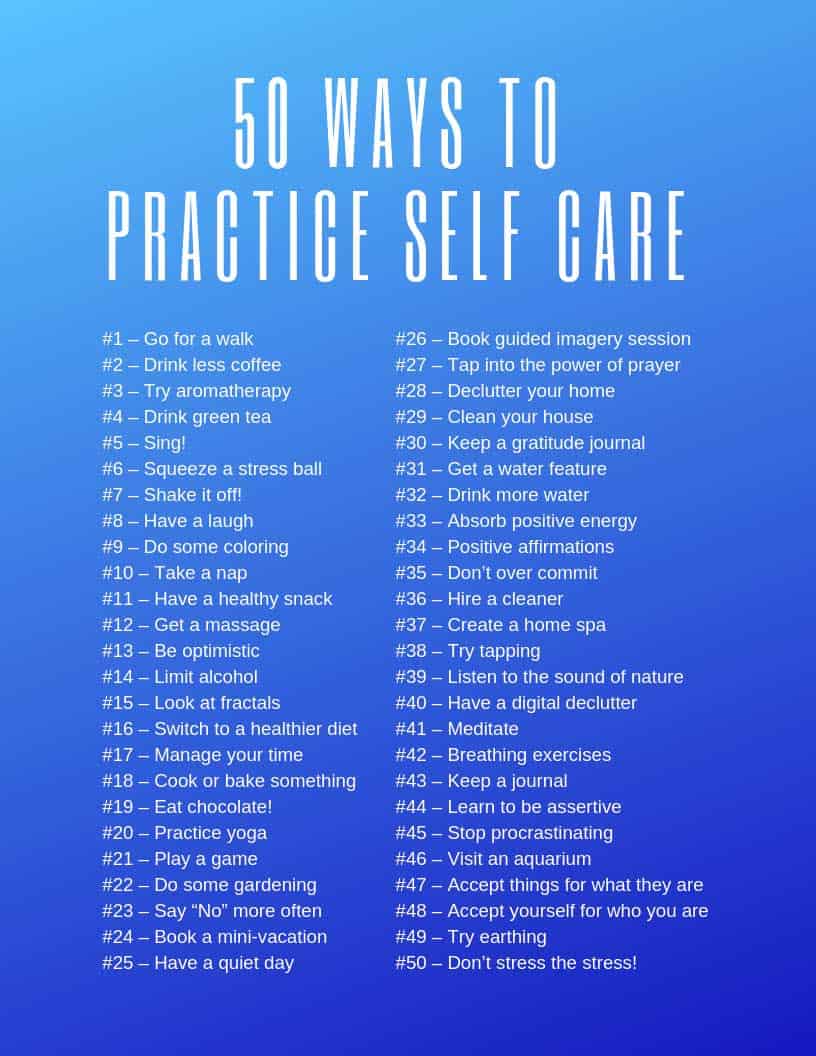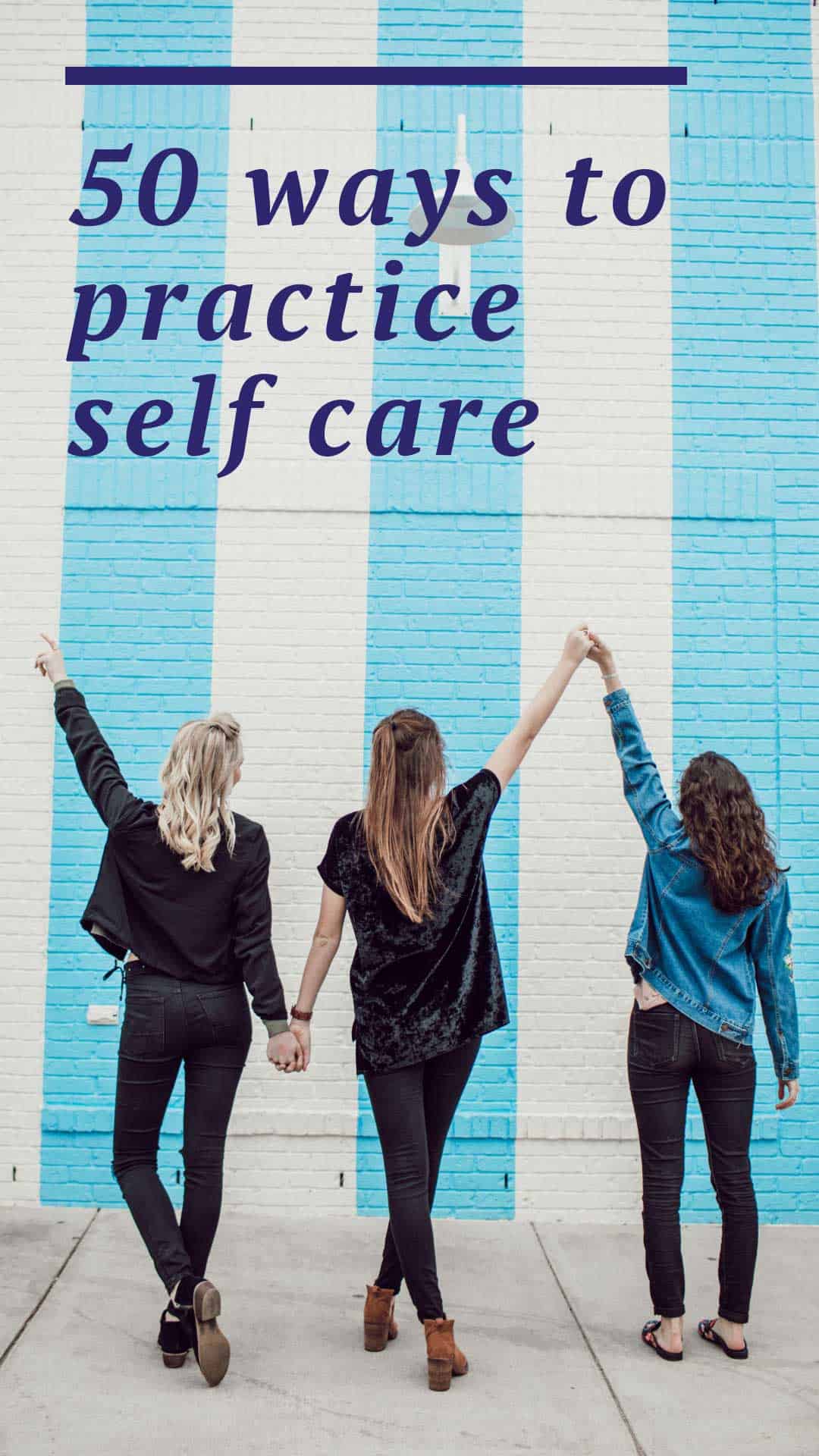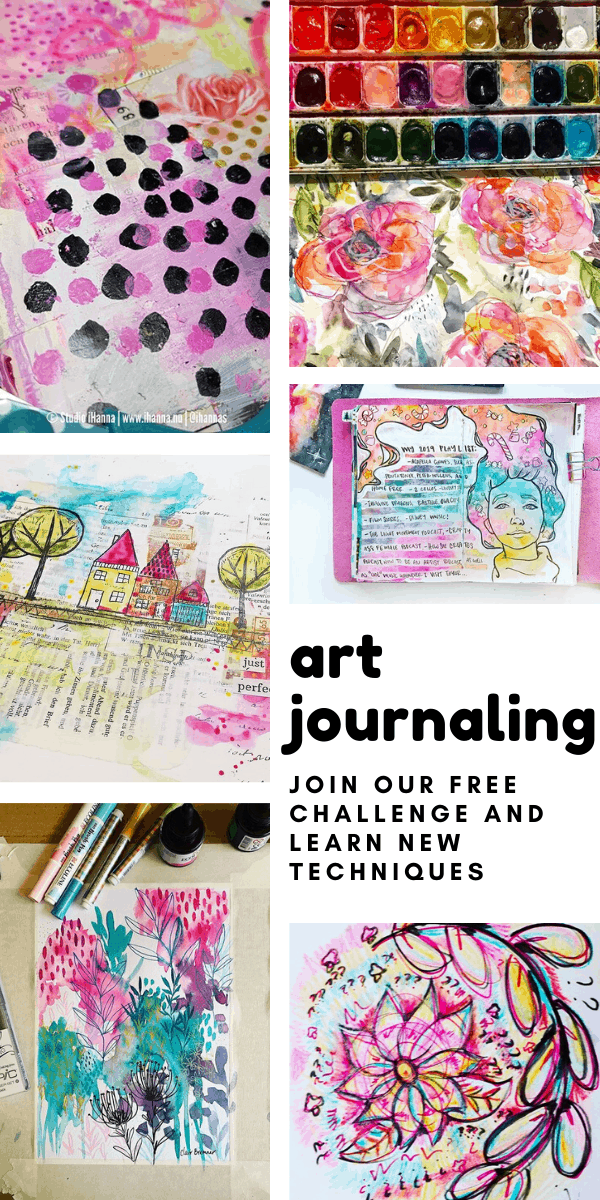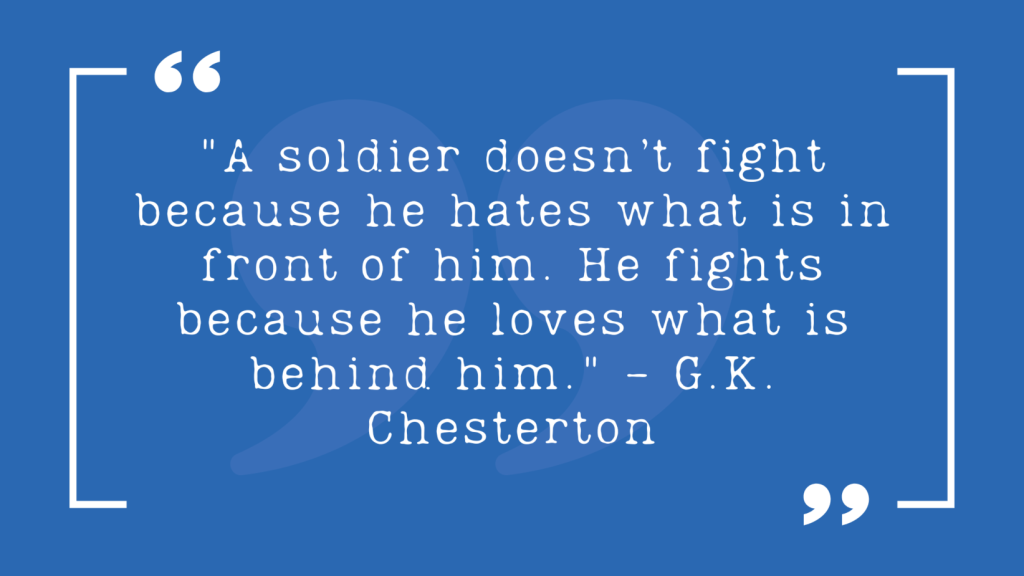This post may contain affiliate links. As an Amazon Associate I earn from qualifying purchases. If you click and buy, I may receive a small commission at no extra cost to you. Read our Disclosure Policy
50 Ways to Practice Self Care
Everyone experiences a certain level of stress at some point in their lives, but it’s how you deal with that stress that determines the effect it has on you, both physically and mentally.
That’s why it is so important to practice self care.
To put yourself first and to give yourself the mental and physical capacity to cope with the stresses that life throws at you.
Whether you feel stressed out because you’re under pressure at work, the kids are driving you crazy at home, or your relationship is going through a rough patch, it’s important to recognize the signs of stress, and even more important to know how to deal with it.
You know that unmanaged stress can take a serious toll on both your physical health and your mental well-being right
Today we’re going to look at 50 ways to practice self care.
Simple things you can do to help you cope with stress.
And there’s even a handy-dandy checklist that you can print out to keep in your journal or on your desk so you are encouraged to actually incorporate some of these things into your life.
Whether you are feeling only slightly stressed, or you are going through a major crisis in your life, being pro-active with your self care will not only help get your stress levels down, but you will also feel more in control.
All of the ideas in this list are effective but they might not all be right for you.
Start with the ones you feel comfortable doing and then test out some of the others.
You might even want to try a different method each day to figure out which ones are most right for you to incorporate into you daily self care routine.
You might also find that the different methods are more useful to you at different times, depending on where you are and what’s making you feel stressed and overwhelmed.
The important thing is to keep those stress levels from bubbling over, so you feel calm and in control and ready to cope with whatever life throws at you!
#1 – Go for a walk
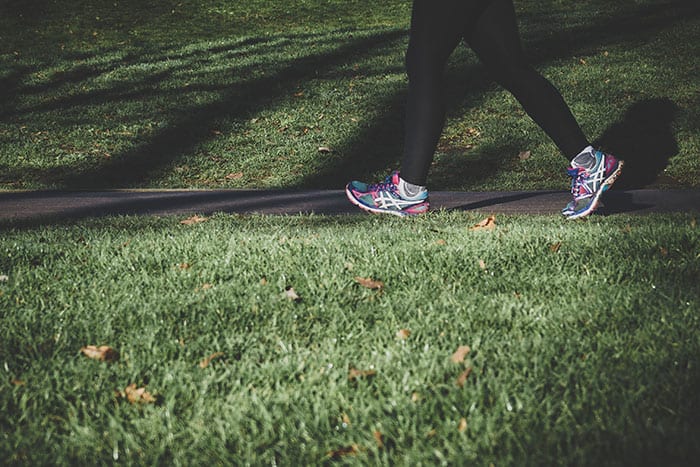
Just by going outside for a walk and breathing in the fresh air you are helping to reduce your stress levels.
Thanks to increased seratonin levels from the oxygen you breathe, you will start to feel happier and more relaxed.
The benefits of getting outside for a walk are multiplied if you can go for a social walk with a friend, or you have a friend of the four-legged variety you can take for a walk.
#2 – Drink less coffee
Are you a coffee lover
It’s the most popular beverage in the world, but unfortunately too much caffeine contributes to increased stress and low quality sleep.
It’s been shown that caffeine elevates the cortisol in your brain to levels that make your body believe it is going through a stressful situation.
You don’t have to give it up entirely, but try and limit your coffee intake to less than four cups a day. And better yet only drink it in the mornings.
#3 – Try aromatherapy
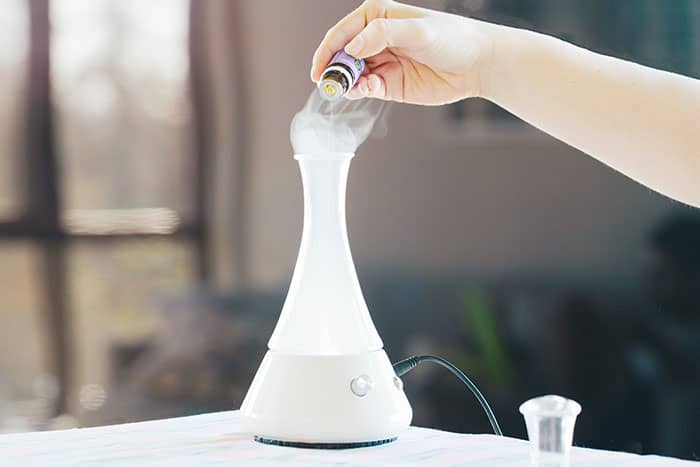
Ordinary smells can affect your mood in positive or negative ways but essential oils can take that experience to a whole new level.
Put a couple of drops of a good quality lavender oil into an essential oil diffuser so you can inhale the benefits.
You should feel calmer and hopefully sleep better too.
#4 – Drink green tea
Here in England drinking tea is seen as the calming solution to every stressful situation, but Matcha Green Tea powder in particular has powerful stress reducing effects thanks to the very high levels of the amino acid L-theanine.
If you drink three to five cups of Green Tea each day, including one before bedtime, you’ll soon start to see the benefits.
You could even try one of these healthy and delicious Matcha desserts to get your green tea fix!
#5 – Sing!
Did you know that singing has been proven to trigger the release of your “feel-good” hormones which reduce stress (as well as improve your cardiovascular system)
So wherever and whenever you get the chance, you should sing!
If the daily commute leaves you stressed, sing in the car on the way, or in the shower as you’re getting ready for work.
Group singing is even more beneficial so consider joining a choral society or take a trip to the local Karaoke bar with friends.
#6 – Squeeze a stress ball
You can relieve a lot of tension and stress, not just from clenched fists but from your whole body, just by squeezing and releasing one of these squishy balls.
You can order them on Amazon or you can even make your own using a latex balloon, water and corn starch.
Squeeze and release for as long as it takes you to feel the stress melting away.
#7 – Shake it off!
Dogs do this all the time to release tension, and it can definitely work for us humans too.
It might feel weird at first, but it’s one of the simplest and most effective things you can to do get immediate relief from tension.
This is what Dr David Sobel of the Healthy Mind Healthy Body Handbook says to do:
“Stand or sit, stretch your arms out from your sides and shake your hands vigorously for about 10 seconds. Combine this with a little deep breathing … and you’ll do yourself twice as much good.”
Or why not shake it off Taylor Swift style. The full body shake always seemed to work for Meredith and Christina!
#8 – Have a laugh
You might not feel like laughing when you’re stressed out, but laughter really is the best medicine to lift your mood and reduce stress.
You could start your day off with a laugh by asking Alexa or Google Home to tell you some jokes.
Or watch a funny movie or tv show in the evening.
The best laughter usually comes with friends though, so meet some of them for a “decaffeinated” coffee and laugh together!
#9 – Do some coloring
You might not have picked up a coloring pencil since you were a kid, but coloring helps you relax and makes you focus on something other than your worries.
It’s been used as a relaxation technique since the early 20th century, and coloring for adults has exploded in popularity in recent years.
Just grab some coloring pencils and a book like this one and start coloring.
Also check out our Mindful Mandalas Daily Planner so you can color in while you keep your day on track!
#10 – Take a nap
Napping during the day doesn’t just help you feel less tired if you had a bad night’s sleep, it can also strengthen your immune system and reduce stress.
So there’s no need to feel like you’re being lazy if you need an afternoon nap.
Don’t sleep for more than 90 minutes though or you might have trouble sleeping that night. Be sure to set an alarm if you need to.
Even a short 10-minute “Power Nap” has rejuvenating benefits and makes you feel refreshed and alert.
#11 – Have a healthy snack
You might think of snacking as one of life’s guilty pleasures, but the right kind of snack can actually reduce stress by releasing the feel-good hormone seratonin into your system.
Go for quick snacks with a high-carbohydrate content such as cereal bars, bagels or pretzels.
Bananas also have the added benefit of being sweet and containing potassium and vitamin B6, which are known to fight stress.
#12 – Get a massage
Massage has been used for centuries in various cultures around the world to promote relaxation and reduce stress.
If you don’t have the time or funds to go to a professional Masseuse, ask a friend or loved one to give you a massage.
It’s even better if they use an essential oil like lavender to help even further with the calming process. Just make sure they use a carrier oil before applying it to your skin.
You can even buy a massage chair, people rave about this one on Amazon!
#13 – Be optimistic
You may think of yourself or other people as born optimists or born pessimists, but optimism can actually be learned.
It involves a shift in mindset for sure, and that will take some time and practice.
But when you start thinking of the glass being half full instead of half empty, you’ll be surprised at how much better you can cope with things that might previously have stressed you out.
Next time you feel stressed about a situation, take the time to sit and reflect at what positives might actually come from it instead of focusing solely on the negatives.
#14 – Limit alcohol
A glass of red wine at the end of a stressful day can undoubtedly help you relax because it’s a sedative.
And having the occasional social drink with friends or colleagues to relax and unwind at the end of the week is a great way to relieve stress in the short-term
Just don’t use alcohol as a crutch.
If you find yourself turning to the bottle every day, you’re going to make your stress a whole lot worse and probably make a whole lot of poor decisions to boot.
#15 – Look at fractals

I confess I’d never even heard of a fractal until Elsa started singing about them!
They’re repeating patterns that you find in the natural world and you can see them in trees, plants, seashells and clouds.
And ice, of course.
Looking at fractals is known to have an almost immediate calming effect so getting outside and looking for them, even for just a few minutes, can help reduce your stress levels.
#16 – Switch to a healthier diet
“Healthy body, healthy mind” is one of those sayings you just can’t argue with.
If you eat unhealthy foods you will not only BE unhealthy, but you’ll also FEEL unhealthy, and your brain and your body will be less able to deal with whatever life throws at you.
You don’t have to give up your favorite foods totally, just try to follow the 80/20 rule – eat good quality protein, fresh vegetables, and healthy fats 80% of the time, and allow yourself treats 20% of the time.
#17 – Manage your time
Time is one of those things that most people say they don’t have enough of.
If you find yourself running around like a headless chicken, trying to accomplish more tasks in the day than you think you can handle, time management can help.
Plan your week in advance with ‘to-do” lists and be specific regarding times, not just the days.
Simply getting more organised will mean you can get more done and stress less on a day-to-day basis.
#18 – Cook or bake something
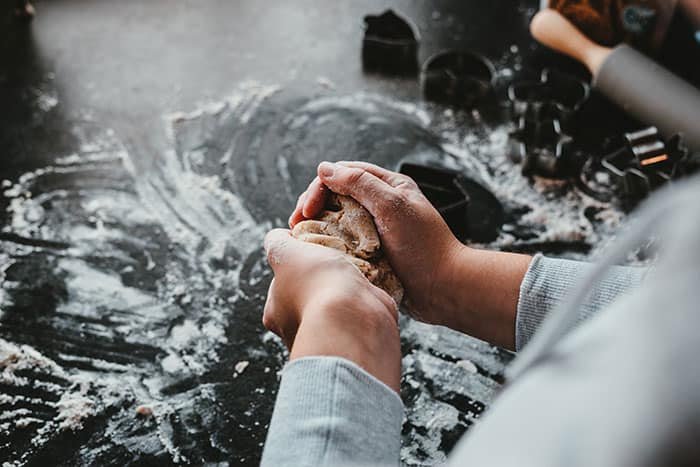
Doing anything creative is a great form of self care, but cooking and baking are not only creative, they they also force you to focus on something other than your stress or anxiety.
You also get some sensory therapy when you cook or bake – the satisfying sizzle, the wonderful aromas as the cooking or baking process progresses, the tastes and the sense of satisfaction at creating something delicious.
Cooking and baking can also relieve stress by bringing back wonderful memories of Grandma’s kitchen or meals you’ve shared with friends.
Try making one of these salted caramel desserts. Yeah they’re not super healthy but they taste amazing!
#19 – Eat chocolate!
Yes, it’s true!
A small study in Switzerland found that people who considered themselves stressed out were able to lower the levels of cortisol in their blood by eating 40g of dark chocolate every day for two weeks.
The key here is the amount and type of chocolate – dark chocolate is high in antioxidants and flavanols.
The higher the cocoa content the healthier it is so make sure you don’t over-indulge on cheap, low-quality chocolate that’s full of sugar and unhealthy fats.
#20 – Practice yoga
The ancient art of Yoga has many incredible health benefits, including the promotion of inner peace and the reduction of stress, even after just one session.
Ask a friend to go to a class with you, or join a Yoga session at work – many employers are now putting on classes for the benefit of their employees.
If you can’t attend a class, buy an inexpensive yoga mat and practice at home by watching videos on the internet.
Start with the easier poses, paying particular attention to the poses that are especially good for stress relief, like the Sukhasana (Easy Forward Bend) and the Uttanasana (Standing Forward Bend).
#21 – Play a game
Playing board games is normally a happy, social activity with friends or family, and that in itself will help you feel more relaxed and less stressed out.
Playing games has other benefits too, including keeping your mind focused and your brain active.
Choose a fun game like Cranium, Balderdash or even dominoes which can’t help but lead to fun and laughter to get those endorphins flowing and that harmful Cortisol on the down low.
#22 – Do some gardening

Gardening is a great stress reliever for several reasons.
Just the act of getting outside and caring for living, growing things is therapeutic in itself.
Digging can also be a great way to get stress relief, but even if you only have a balcony or a patio, you can still get the benefit of gardening.
Get outside in the sun, soak up the Vitamin D and create something beautiful, or grow some fresh herbs or other produce, even if it’s only in a raised bed or pots.
#23 – Say “No” more often
No can sometimes seem like the hardest word to say to someone, especially if you really want to help out.
But if you’re already over-stretched for time, or simply can’t take on what’s being asked of you, not being able to say no isn’t going to do your stress levels, or you, any favors at all.
Just be polite but firm and say something like “I’m sorry, but I simply can’t fit that in my current schedule.”
The first time you say no to a request will be the most uncomfortable if you’re used to saying yes all the time, but stick to your guns. It will get easier, and you will reap huge benefits in the long run.
#24 – Book a mini-vacation
Vacation time doesn’t have to mean saving for months and travelling thousands of miles for 14 days solid.
In fact, science shows that mini-breaks are more beneficial than long stays when it comes to helping with relaxation and stress relief.
A cheap and cheerful, impromptu weekend away could be just what the doctor ordered when it comes to reducing your stress levels.
Look for last-minute bargains online, check out AirBnBs or even call an old friend or family member you haven’t seen in a while and arrange a visit.
#25 – Have a quiet day
Life for many people these days is hectic and noisy, and it can be hard to find time for peace and quiet, but it can be extremely beneficial to your health.
Find a day when you can be a home with no interruptions and no noise.
Unplug your phone, switch off your mobile, disconnect from the world and try to remain silent for the whole day.
Sit, kneel or lie down and really take the time to relax, nurture a peaceful mindset and cherish the silence.
You can combine this with some yoga or guided imagery for even more mind and body healing benefits.
#26 – Book a guided imagery session
Guided imagery is a form of meditation that has been used for centuries in Greek, Chinese and American Indian cultures to promote relaxation.
You’ll be asked to imagine yourself in a place where you feel totally serene and at peace, such as a beautiful beach, or a forest waterfall or by the side of a peacefully flowing river, imagining the sights, sounds and smells that surround you.
If you don’t want to visit a therapist, you can find guided imagery CDs on Amazon, so you can practice it in the comfort of your home if you prefer.
#27 – Tap into the power of prayer
Studies have shown that having faith and the act of praying is beneficial for mental health.
Whatever your beliefs you can benefit from simply kneeling down or bowing your head and asking your God or the Universe to help you get through the difficulties you are going through or the negative feelings you are experiencing.
Praying out loud can help you vocalize and clarify in your own mind what improvements you wish for in your life.
#28 – Declutter your home
The act of decluttering your home can be extremely cathartic for many people, possibly even symbolic of getting rid of your problems and starting over.
Go through the kitchen cabinets and your closet, be honest with yourself and gather together everything that doesn’t mean anything to you or doesn’t add value to your life.
Sell everything to give yourself a little extra cash, or give everything to charity and feel even better that you’re helping those less fortunate.
#29 – Clean your house
Now you’ve decluttered your home it’s time to clean it!
Housework is quite a physical activity, so you’re going to benefit from the exercise and the release of those feel-good hormones that happens with physical exertion.
Put on some upbeat music while you’re cleaning and you’ll benefit even more.
Not only will you feel a sense of satisfaction at having a clean house when you’re finished, but you’ll also feel more relaxed and less stressed thanks to the endorphins coursing through your veins.
#30 – Keep a gratitude journal
Keeping a journal has been scientifically proven to reduce stress.
Having a Gratitude Journal allows you to focus on all the good things you have in your life, rather than thinking about what’s causing you to feel stressed.
It also allows you to put your stressors into perspective, so they don’t feel as significant as they did before.
Make a habit of using your Gratitude Journal on a daily basis to record everything that you were grateful for that day that brought a smile to your face.
When you’re having a bad day, it will help to read back and realize it’s not all bad all of the time.
#31 – Get a water feature
The sound of gently running water is not only relaxing and soothing to the soul; having a water feature in your home also helps to purify the air you breathe by producing negative ions.
There are many beautiful wall mounted fountains which double as decor for your garden, or you can purchase a tabletop fountain to use indoors to counteract the positive ions produced by the electrical equipment in your home and elevate your serotonin levels.
Many people also find it helpful to meditate to the sound of running water.
#32 – Drink more water
While we’re on the subject of water, are you drinking enough
More than half of an adult’s body is made up of water, and every single organ needs water to function efficiently.
Make sure you drink at least 2 liters of water per day (men need 2.5 liters) to stay hydrated and stop your body from getting stressed from not being able to work properly.
Don’t forget you need to drink more when you’re exercising or during the summer months when it’s hot outside.
You also have the added benefit of a possible increase in your metabolism when you drink more water.
Check out our creative ways to decorate a water bottle to encourage you to drink more h2o!
#33 – Absorb positive energy
Part of self care involves spending time with other people, but you need to make sure you surround yourself with people who have a positive outlook on life.
Limit the time you spend with people who spend their time moaning about what a bad hand they’ve been dealt.
You can be empathetic of course, but do not allow yourself to get enveloped in their problems and their negativity, especially if you’re already feeling stressed yourself.
You will only drag each other down, and that helps nobody.
You can also absorb positive energy from listening to upbeat music, watching a feel-good movie, or reading a book with a happy ending.
#34 – Start your day with positive affirmations
Affirmations are simply positive statements that encourage positive self-talk.
If you find yourself dwelling on negative thoughts and beliefs about yourself affirmations can help you be more positive.
You think about the qualities you want to see in yourself and then use the affirmations to train your mind into believing them.
You can write out your own affirmations by starting a sentence with “I always…”.
Or you can buy a pack of pre-printed affirmation cards like these.
This is a practice you can encourage your children to learn too, this set of affirmation cards for kids is a good place to start.
#35 – Don’t over commit
There are so many opportunities for us these days, and we’re all eager to live life to the full.
But trying to pack too much into our lives only leads to exhaustion and burn-out, and ultimately stress.
If you over-commit and try to do too much, you won’t be able to enjoy yourself properly because your mind will always be on the next item on your busy schedule.
Take a good hard look at your calendar and try to find things that have perhaps become more of a habit than enjoyment and weed them out.
That way you’ll be able to fit in the things you really enjoy, and that leave you feeling fulfilled.
#36 – Hire a cleaner
Talking of packing too much in, there are some things in life that are unavoidable, one of which is cleaning the house.
Doing housework has it’s stress relieving benefits as discussed earlier, but if it’s something that you absolutely hate and makes you miserable, get someone else to do it!
Don’t feel like you’re being lazy or are failing by not keeping your home spotless.
There is clear research to prove that the people who outsource jobs and chores, effectively buying themselves more time to do other things, are actually happier and healthier.
#37 – Create a home spa

It’s easy to neglect yourself when you’re busy, but making time for some pampering is essential for your overall health and well-being.
Creating a home spa can be as easy as dropping a bath bomb into the tub and relaxing with scented candles and soothing music for half an hour.
If you don’t have a tub, invest in a foot spa to relax your feet in while you sit back with a rejuvenating face mask on and feel all your stress slipping away.
Just make sure you schedule a time when you know you won’t have any interruptions from crying children or other distractions.
#38 – Try tapping
EFT (Emotional Freedom Technique) Tapping has its roots in the ancient Chinese art of acupuncture and is widely used to help anyone from War Veterans with their PTSD to people suffering anxiety.
Tapping stimulates the bodies Meridian (or Acupressure) Points to calm the amygdala, the part of your brain that is triggered when you are frightened or feel stress, and reduce levels of cortisol.
Once you learn the simple technique, you can use it whenever you’re feeling stressed about something, rather like an instant therapy session that you can do anywhere.
#39 – Listen to the sound of nature
It’s no coincidence that a walk in the forest by the side of a gently babbling brook, listening to the rustling of leaves and the chirping of the birds makes you feel relaxed.
But if you live in the city or can’t get outside, put your headphones in and listen to a nature sounds CD to listen to the rain, or the sound of the ocean, and you’ll soon feel your stress melting away.
You might even want to invest in white noise machine to keep by your bedside and help you sleep better.
#40 – Have a digital declutter
People who take steps to declutter their digital life say they feel much more organized, are less distracted, have higher productivity and feel less stress from both digital overwhelm and life in general.
There are lots of ways to declutter your digital life but here are a few you can start with:
Stop constantly checking your email and unsubscribe from those you never read;
Turn off notifications that aren’t necessary;
Consider changing your ring tone to something more soothing – noise pollution is a major cause of stress.
#41 – Meditate
Meditation doesn’t have to mean sitting cross-legged for an hour in silence.
You can lower your stress level fast with just a short meditation session.
Clearing your mind and focusing on your natural breathing, even for just five short minutes can calm your mind and help you put things into perspective.
To fully reap the many health improving and stress-reducing benefits of meditation try to set aside a 20-minute window three times a week if possible.
If you’re a beginner or you find meditation difficult, try using a Guided Meditation App.
#42 – Breathing exercises
Breathing is something we do every day without a thought but controlled and mindful breathing can bring many health benefits, including reducing stress, lowering blood pressure and calming the mind.
Breathing exercises can be done in conjunction with meditation or yoga, but they are also a very effective standalone treatment to reduce stress and anxiety wherever and whenever you’re feeling it.
Learning how to breathe properly could well be one of the best life skills you can have – literally!
#43 – Keep a journal

Start keeping a journal to record your thoughts and feelings on a day to day basis.
It’s scientifically proven to help with stress relief as well as improving cognitive function and even strengthens the immune system.
Write down both positive and negative feelings so you become more self-aware and can grow from your experiences.
What happened
How did you react
How do you wish you had reacted
What thoughts did you have but didn’t vocalize
Make sure to read back each entry a few days later so you can re-assess the issues that arose and learn from how you reacted and felt.
#44 – Learn to be assertive
If you find your stress levels regularly rising because you feel you’re being taken advantage of, or you find it hard to say “no” to people because you’re too nice, learning assertive communication could be the answer.
Being assertive means standing up for your rights and feelings, while at the same time respecting other people’s rights and feelings.
Stay calm, listen actively and then speak openly and honestly.
You can attend online classes or find Assertiveness & Self Confidence classes in your local area.
#45 – Stop procrastinating
Procrastination means putting things off that need doing, usually important things, because you either feel overwhelmed by the tasks ahead of you or because you can’t decide how to do them.
Get over it by breaking your to-do list into smaller chunks and complete one task that can be done quickly.
There, you’ve started!
Take the next thing on the list you know you can do easily.
Don’t you feel less stressed and overwhelmed already
Now just keep going one step at a time.
If you find yourself procrastinating again, break the tasks down even more.
Failing to stop procrastinating will just lead to tighter deadlines, rushed action and even more stress.
#46 – Visit an aquarium
There’s something magical and relaxing about watching fish swimming gently round in a tank of water.
In fact, scientists at the National Marine Aquarium found that when people visited and were able to watch marine creatures going about their business, their moods were lifted, they felt less stressed, and their heart rates and blood pressure were lowered.
For a continuous fix buy a home aquarium and fill it with small, colorful tropical fish for a chill session whenever you feel the need.
Or if you don’t want the added pressure of actually caring for fish get one of these artificial fish tanks instead!
#47 – Accept things for what they are
Learning to accept things for what they are is the best way to dial down your stress levels.
You cannot control everything around you, and there’s no point stressing over things you cannot change – it’s just wasted time and energy.
Instead, focus your energy and attention on the things you can change.
You might still feel stressed over the things you can change, but you can relieve that stress by taking focused action steps to change them for the better.
#48 – Accept yourself for who you are
We talked about accept things above, but you also need to learn to accept yourself.
There is a direct correlation between stress, overall health and low self-esteem, so learning to love yourself, warts and all is a major part of enjoying a healthier, happier life.
Practice reminding yourself about what you’re good at.
Don’t think in terms of good and bad – some features and characteristics are just not as good as others. Don’t put others on a pedestal – have realistic expectations of other people, and of yourself.
As Kurt Cobain once said “Wanting to be someone else is a waste of the person you are.”
#49 – Try earthing
Earthing, or grounding as it’s also known, is a simple, natural and free stress reduction technique that works to reduce stress hormones and inflammation.
Take off your shoes and socks and walk around barefoot on natural surfaces like grass, soil and sand.
Even unpainted concrete works to neutralize free radicals.
For an indoor solution look for earthing mats, or invest in an earthing mattress pad to help you reduce stress and sleep even better at night.
#50 – Don’t stress the stress!
Finally, it’s easy to get fixated on how stressed you feel as you go about your daily life.
Stress is natural and everyone feels it at some point or another.
But just thinking about how much stress you have going on in your life can increase your cortisol levels even further and so begins the vicious cycle of stressing about stress.
Accept that you feel stressed sometimes and use these ideas to take positive action to kick stress to the curb at any opportunity.
Download Your Free Printable Checklist
This is a long list so we’ve created a checklist that you can get and print out so you can keep track of the different ideas.


